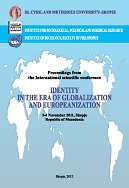THE EUROPEAN UNION AS AN “UNKNOWN POLITICAL OBJECT” OR A POSTMODERN POLITICAL COMMUNITY IN THE PROCESS OF CONSTITUTING OF ITS OWN INTERNATIONAL
THE EUROPEAN UNION AS AN “UNKNOWN POLITICAL OBJECT” OR A POSTMODERN POLITICAL COMMUNITY IN THE PROCESS OF CONSTITUTING OF ITS OWN INTERNATIONAL
Author(s): Goran IlikSubject(s): Politics / Political Sciences
Published by: Институт за социолошки и политичко-правни истражувања
Keywords: International political identity; political community; European Union; postmodernism
Summary/Abstract: This paper represents an explication of the fundamental premises for the definition of the term identity in a political / international political sense, in correlation with the ontology of the European Union as a specific legal and political entity. Therefore, we should not talk at any costs about the EU “nationalisation” or “etatization” because of the specific geopolitical, strategic and certainly the geo-economical conditions, in which it is born, grows and functions, which are also radically different in relation to others. Namely, when talking about the Union in relation to others, at the same time its specificity must be stressed, also autonomy and distinctiveness as attributes of its international political identity. The title of the paper stems precisely from the formulation of the European Commission President Jose Manuel Barroso, who once said: “The EU is functional, but also an unknown political object on the international political scene”. In this respect, are presented the key benefits of the Lisbon Treaty in this area, because it appears as a “new opportunity” for the embodiment of the EU as a political union. This Treaty, initiates the Union in a politea sui generis in status nascendi or a political community of particular type in a phase of birth. In this regard, this paper underlines the postmodern nature of the Union, which makes it different than other global actors even more. On this basis, there is emphasis that identity is not something static, or fixed, but it is a dynamic process of (self) recognition, differentiation and establishment of a recognizable image of the particular political community in the existential environment. While taking into account the growing “density” of the multilateral relations, permanent communication with other international actors and the intensity of the globalization as an unstoppable process, the Union within its Common Foreign and Security Policy, aims to produce a referent level of solidarity and cohesion as essential elements of such political / international political identity. In addition, the paper presents the theories and doctrines of realism, liberalism and their derivatives, such as: neorealism, neoliberalism and neofunctionalism as dominant theories that more accurately specify the essence of the international political identity, nature and profile of the Union in the international relations.
Journal: Proceedings from the International scientific conference
- Issue Year: 2012
- Issue No: 1
- Page Range: 213-222
- Page Count: 10
- Language: English
- Content File-PDF

